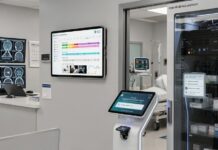Introduction
The healthcare industry has significantly transformed how patient interactions and administrative tasks are managed in recent years. The rise of medical office virtual receptionists is an innovative response to the growing demands on family practices. These professionals offer various benefits that streamline office operations and enhance patient experiences. This article will explore the advantages of employing virtual medical receptionists in family practices, focusing on efficiency, cost-effectiveness, patient engagement, and work-life balance for healthcare professionals.
Enhancing Efficiency in Administrative Tasks
Among the main benefits of virtual medical receptionists is the considerable increase in operational efficiency they bring to family practices. Traditional receptionists often face the challenge of simultaneously managing multiple tasks—answering phone calls, scheduling appointments, handling paperwork, etc. When these responsibilities are outsourced to virtual receptionists, the family practice can ensure that a dedicated professional handles each task.
Family practices benefit from extended operational hours with virtual receptionists. Many virtual receptionists can cover peak and off-peak hours, ensuring patients can reach the practice conveniently. This flexibility reduces the likelihood of missed calls and appointment bookings, fostering better patient engagement and satisfaction.
Cost-Effectiveness
Implementing virtual medical receptionists can also lead to substantial cost savings for family practices. Hiring a full-time, in-house receptionist incurs salaries, benefits, and training costs. Conversely, virtual receptionists often work as independent contractors or through service providers, typically lowering operational costs.
Moreover, with virtual receptionists handling tasks like appointment scheduling and patient inquiries, family practice owners can allocate their resources more effectively. This allows the practice to focus on essential aspects of patient care, thereby enhancing overall productivity and profitability.
Improved Patient Engagement and Satisfaction
Engaging with patients effectively is crucial for family practices seeking high-quality care. Virtual medical receptionists play a vital role by ensuring that every patient interaction is handled professionally and empathetically. They are trained to manage patient inquiries, provide appointment reminders, and follow up with patient’s post-visit, creating a seamless communication experience.
Personalized patient engagement strategies adopted by virtual receptionists can significantly boost satisfaction rates. For example, virtual receptionists can collect meaningful patient feedback, allowing practices to make necessary adjustments and improvements based on their client’s needs and preferences. This proactive approach is essential for building long-term patient relationships and fostering practice loyalty.
Work-Life Balance for Healthcare Professionals
Family practice owners and healthcare professionals often struggle to balance work responsibilities with their personal lives. The demanding nature of the healthcare industry can lead to burnout, stress, and reduced productivity. Virtual medical receptionists offer a viable solution to this problem by taking over non-clinical tasks and freeing medical staff to concentrate on patient care.
With virtual receptionists managing administrative duties, family practice owners can enjoy more flexible schedules, reduce stress levels, and improve overall work-life balance. This helps foster an amiable workplace culture and retain top talent in the long run.
Increased Accessibility for Patients
Virtual medical receptionists also facilitate increased accessibility for patients, particularly those residing in remote places or facing mobility challenges. Virtual receptionists allow patients to book appointments and access important information without physically visiting the practice. This also benefits elderly patients who may not be tech-savvy, as virtual receptionists can assist them with scheduling appointments over the phone.
Moreover, virtual receptionists can provide multilingual support, catering to non-English speaking patients and improving accessibility for a diverse patient population.
Increased Data Security
Healthcare organizations’ main issue is data security practices in today’s digital age. Virtual medical receptionists offer an added layer of protection by reducing the need for physical paperwork and sensitive patient information to be handled internally. With secure online systems, virtual receptionists can safely process and store patient data, reducing the risk of breaches.
Flexibility and Scalability
Family practices often experience fluctuations in patient volume, which can complicate administrative tasks. Virtual medical receptionists offer remarkable flexibility, allowing practices to modify their offerings according to the moment’s demands. For instance, a practice can quickly increase its use of virtual receptionist services during peak seasons or after acquiring new patients without requiring lengthy hiring processes.
This scalability allows family practices to adapt to growth seamlessly while maintaining high-quality administrative support. It also provides options for remote work, which has become increasingly important in recent years, allowing team members to more easily balance their professional and personal commitments.
Enhanced Data Management and Security
Virtual medical receptionists integrated into family practices can significantly improve data management capabilities. These receptionists often utilize advanced software and technologies to maintain patient records, track appointments, and manage billing processes. This centralized approach ensures that all data remains organized and accessible, reducing the risk of errors associated with manual data entry.
In addition, virtual receptionists are typically well-versed in best practices for data security and patient confidentiality. They can implement measures to protect sensitive information, which is especially critical in an era when data breaches are on the rise. This high level of data security reassures patients that their personal information is safe.
Work-Life Balance for Healthcare Professionals
One of the less discussed benefits of employing virtual medical receptionists is the positive impact on the work-life balance of healthcare professionals. Reducing administrative burdens can lead to a healthier work environment in a demanding field where practitioners often face burnout.
By alleviating the pressures of phone calls, scheduling, and patient inquiries from in-house staff, family practices allow medical personnel to concentrate more on patient care rather than administrative tasks. This change may result in more job satisfaction, higher morale among staff, and ultimately better patient outcomes.
Conclusion
In conclusion, DocVA virtual medical receptionists’ advantages for family practices are manifold and substantial. They enhance operational efficiency, reduce costs, improve patient engagement, and contribute to a healthier work-life balance for healthcare professionals. When the healthcare industry changes, adopting creative solutions like virtual medical receptionists can position family practices for success in a competitive environment. As we progress, those practices that leverage such advancements will undoubtedly enhance their service delivery and foster a more patient-centric approach.


















